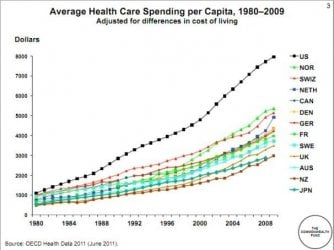Do yourself a favor...educate yourself.
Ironic that you would use that term, since I actually do have to educate myself by taking annual training on a variety of topics that include health insurance, health care administration and Medicare. Which is why I don't like the "plans" offered by either "side". What I don't do is push one side based on politics. How about you?
You can divert all you want. The fact remains that HHS told Obama this was going to happen, and now you left wing partisan ideologues are claiming that it's okay if people lose their plans because they're lousy plans anyway. You can spin his lies all you want, you can plant all the straw man arguments you want - you're defending lies. Have fun with that.
.
I don't 'side' with anyone but the people of this country. Insurance cartels are the source of the problem. If you are so 'educated' about health insurance, then the term 'medical loss ratio' should be very familiar to you. Every other industrialized nation has figured out that there is no 'free market' solution to health insurance. Liberals and progressives are not big supporters of the new law, but it is an improvement over the status quo. If the liberal and progressive wings of the Democratic Party had any power, we would have at least had a public option. The ability to PAY FOR Medicare before you are eligible for coverage.
The cost of doing nothing is always just 'forgotten' by all the right wing whiners and cry babies.
The Cost of Doing Nothing
Why the Cost of Failing to Fix Our Health System Is Greater than the Cost of Reform
2008
The U.S. health care system is in crisis. Health care costs too much; we often get too little in exchange for our health care dollar; and tens of millions of Americans are uninsured.
Our economy loses hundreds of billions of dollars every year because of the diminished health and shorter lifespan of the uninsured. Rising health care costs undermine the ability of U.S. firms to compete internationally, threaten the stability of American jobs, and place increasing strain on local, state, and federal budgets. As health care costs continue to rise faster than wages, health insurance becomes more and more unaffordable for more and more American families every day.
Yet, the recent financial services meltdown has led some people to suggest that we cannot afford health reform and that fixing our broken health care system will have to wait once again. But waiting comes with a price. The crisis worsens every day that we do not act. Premiums will continue to rise; Americans will continue to pay more for less-generous health coverage; and fewer employers will offer health insurance to their workers.
We must reform our struggling health system not in spite of our economic crisis, but rather because of the impact health care has on the American economy. The economic and social impact of inaction is high and it will only rise over time.
Economic Cost
The economic cost of failing to fix our broken health care system is greater than the upfront expense of comprehensive health reform. In 2006, our economy lost as much as $200 billion because of the poor health and shorter lifespan of the uninsured. This is by most estimates as much as, if not greater than, the public costs of ensuring all Americans have quality, affordable, health coverage. The economies in California, Texas, and Florida suffer most from productivity loses stemming from the uninsured. Yet, Delawares economy loses more per uninsured person -- over $6,800 per uninsured resident.
Affordability
As health care costs continue to grow faster than wages, health insurance will become more and more unaffordable for more and more American families every day. The financial burdens associated with health care and health insurance will only get worse over time without action.The cost of the average employer-sponsored health insurance plan (ESI) for a family will reach $24,000 in 2016. This represents an 84 percent increase over 2008 premium levels. Under this scenario, we estimate that at least half of American households will need to spend more than 45 percent of their income to buy health insurance.
More
Health care costs in the United States went off the tracks soon after the federal government initiated medicare. The liberals did not have enough common sense to know that massive amounts of government money will always screw up the cost curve in any market, and will always lead to the need for more government intrusion in that market.
The solution is for the federal government to get the hell out of general health care, out of health care insurance, and out of our friggin private lives.
If you want to provide health care for old people, set up a government operation that does just that. Government hospitals, government clinics, and government doctors, can take care of old folks, poor folks and the illegals, the the rest of us can manage on our own in the private health system.
Like most liberal/socialist concepts, this drive for insuring everyone is more about control of the people than it is about healthcare.



